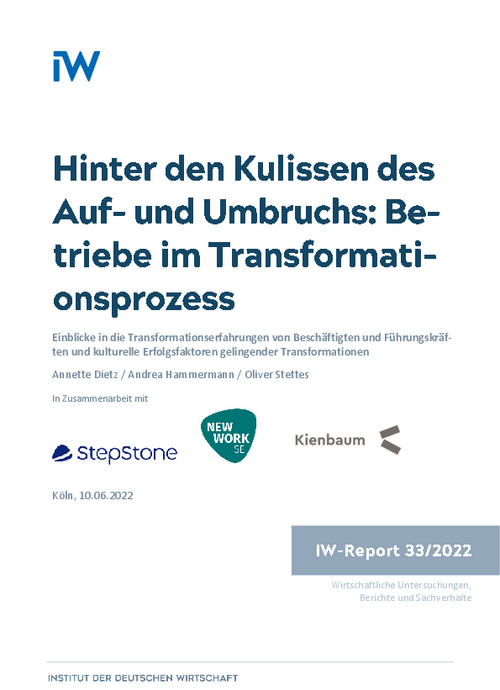The pressure on companies and their employees to change and adapt is enormous against the background of megatrends such as digital and ecological change.

Behind the scenes of upheaval and change: Businesses in the transformation process
Study in collaboration with StepStone, New Work Se and Kienbaum

The pressure on companies and their employees to change and adapt is enormous against the background of megatrends such as digital and ecological change.
The successful management of change depends to a large extent on how companies succeed in empowering employees for change and promoting their willingness and acceptance. Without a corresponding culture of change, "rejection reactions" can set in, since companies are living systems consisting of people with their emotions. Where all six aspects of successful transformation processes are mentioned in the empirical analysis, it is assumed that the "energy level" reaches a level at which the probability of a successful transformation project is high. Based on the IW/StepStone/New Work/Kienbaum survey 2021, this study takes the perspectives of managers and employees without management responsibility and examines their perception of six aspects that can be defined as success factors in the sense of the change management literature.
The operationalisation of successful transformations based on the six aspects includes that the necessity of change is well explained, the associated strategy is transparent for employees, their demands are respected to an appropriate degree, employees can help shape the transformation process, investments are made in further training measures and a good culture of error is cultivated. The empirical analysis shows that in companies where several of these aspects are considered in change processes, the commitment of the employees - measured by the lower tendency to change and the higher job satisfaction - is also stronger. From the perspective of managers, it is also evident that the entrepreneurial ability to respond (quickly) to external fluctuations correlates closely with change management, which initiates the necessary changes and manages them well. c Change is associated with uncertainty about the future. The study offers a look behind the scenes, at the perceptions, feelings and assessments of the employees and shows that the more the people concerned see themselves in a position to master the challenges ahead, the less uncertainty is perceived as a danger or risk and the more it is perceived as an opportunity. A corporate culture that aims to promote employees' ability and willingness to change and to actively mobilise their potential in everyday work is significantly more likely to be associated with transformation processes having the promising characteristics studied.

Behind the scenes of upheaval and change: Businesses in the transformation process
Study in collaboration with StepStone, New Work Se and Kienbaum

More on the topic

What factors influence the career ambitions of people with disabilities?
Many companies in Germany report having difficulties not only in recruiting employees, but also in filling vacant management positions.
IW
Leadership in transformation: Megatrends and management as a driver of change
Leadership dynamics in companies are subject to constant change in order to meet the challenges of their time. Today, the greatest influences result from developments such as demographic change, globalization, individualization, structural change and ...
IW